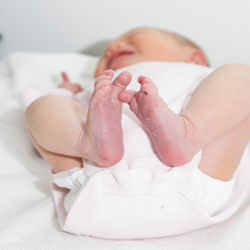Timely tips for tots

by Richard Haber, MD
Iron deficiency and stroke in toddlers
Iron deficiency and stroke in toddlers
Iron deficiency anemia is common in young children, usually because of poor dietary intake. Dr. Jonathan L. Maguire and colleagues bring to our attention the relationship between this and ischemic stroke (Pediatrics 2007;120[5]:1053-7). The study was case-controlled, comparing 15 ascertained cases from the stroke registry of the Hospital for Sick Children in Toronto with 143 controls from the general population. The ischemic stroke patients were previously healthy children aged 12-38 months, a time with a high prevalence of iron deficiency. Subjects were excluded if there was a known cause such as sickle cell disease, trauma, meningitis or any type of coagulopathy. Iron deficiency was defined as serum ferritin level < 12 µg/L, hemoglobin < 110 g/L, mean corpuscular volume < 73 fL and thrombocytosis as > 450 platelets x 109/L. With controls and subjects evenly matched for age and sex, a significant association was noted between iron deficiency anemia and ischemic stroke, with an odds ratio of 12. Even after controlling for thrombocytosis, the authors found a 10-fold increased risk of ischemic stroke in otherwise healthy children who are iron-deficient. The pearl: pay attention to nutritional issues in toddlers and young children.
Outgrowing egg allergy
Outgrowing egg allergy
Another article that caught my attention was entitled The natural history of egg allergy (Savage JH et al. J Allergy Clin Immunol 2007;120[6]:1413-7). After milk, egg is the second commonest food allergen in kids. Using rigorous definitions of IgE-mediated reaction, the authors identified 881 patients from a retrospective review of charts in the Johns Hopkins allergy clinic. Looking at tolerance, they showed that 4% of subjects were able to ingest a whole egg by age 4 years, 26% by age 8, 48% by 12 and 68% by 16. By age 18, most of those with an initial egg IgE > 50 kU/L were still allergic. Children with atopic disease or more than one food allergy took longer than others. The pearl: tolerance to egg does develop over time, but the higher the initial egg IgE, the longer it takes.
Early correction for undescended testis
Early correction for undescended testis
Pediatric surgeons recommend orchiopexy at 9-15 months of age because of the risk of testicular cancer. Despite these recommendations, a significant number of boys in Sweden are operated on at a much later age, 5% at adolescence. Pettersson A et al (NEJM 2007;356[18]:1835-41) identified a cohort of 16,983 men with a diagnosis of cryptorchidism treated by surgery. These were then followed for an average of 12 years from age 15 years, or from the age at surgery plus 1. The risk of developing testicular cancer increased with age at surgery. Those operated after age 13 (puberty) faced twice the risk. The pearl: this paper supports current recommendations of early intervention.
Richard Haber, MD, FAAP, FRCPC is an associate professor of pediatrics at McGill University and the Director of the Pediatric Consultation Centre at the Montreal Children’s Hospital.


